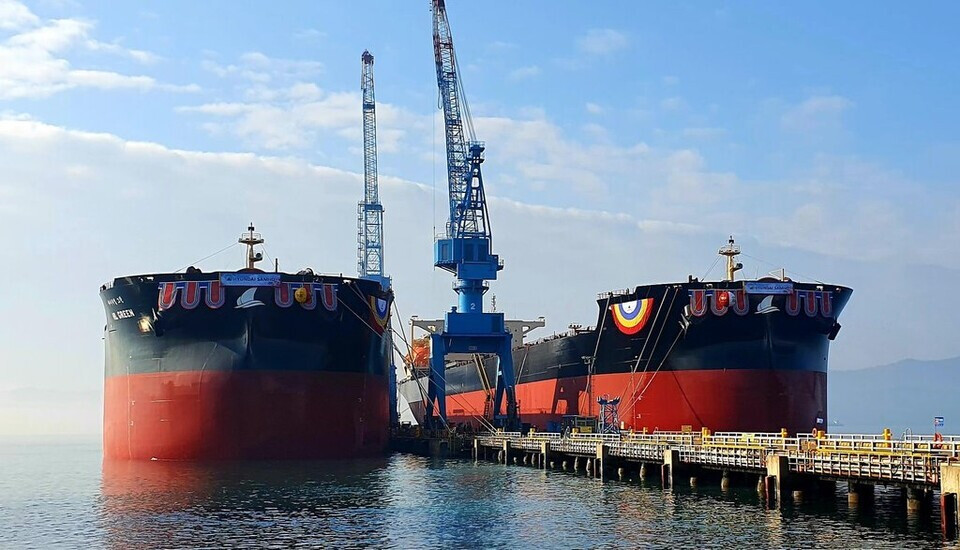
The escalating trade tensions between the United States and China have extended to the maritime sector, with the U.S. government actively considering the imposition of substantial port entry fees on vessels constructed in China. This potential move appears to be already casting a long shadow over the Chinese shipbuilding industry, as evidenced by a dramatic and unprecedented decline in bulk carrier orders received by Chinese shipyards in the first quarter of 2025.
According to a recent report by TradeWinds, a prominent publication covering the shipbuilding and maritime trade, data compiled by the esteemed shipbuilding and shipping market analysis firm Howe Robinson indicates a staggering drop in bulk carrier orders for Chinese shipbuilders. In the first three months of this year (January to March), Chinese yards managed to secure a mere 13 orders for bulk carriers. This figure marks a historic low, representing the most meager intake of such orders in 32 years, since 1993. When juxtaposed with the 143 bulk carrier orders clinched by Chinese shipbuilders during the corresponding period in 2024, the first-quarter performance of 2025 reveals a precipitous decline of 90.9%. This stark contraction is particularly noteworthy considering China's dominant position in the global bulk carrier market, holding a commanding 70% share of the total order book as of the end of the previous year.
Industry analysts widely attribute this abrupt and significant downturn in China's bulk carrier order volume to the proactive measures being contemplated by the United States Trade Representative (USTR). In a move signaling growing concern over alleged unfair trade practices, the USTR announced in January of this year its consideration of levying hefty port entry fees specifically targeting Chinese-owned shipping companies and vessels constructed in Chinese shipyards. The rationale behind this potential action stems from the USTR's assertion that the Chinese government's purported provision of excessive subsidies to its shipbuilding and shipping industries is causing demonstrable harm to American commercial activities and undermining fair competition.
To address these concerns, the USTR has indicated its intention to potentially invoke Section 301 of the Trade Act of 1974, a powerful tool that allows the U.S. President to impose tariffs or other trade restrictions on countries engaging in unfair trade practices that harm U.S. commerce. The proposed measure under consideration includes a substantial port entry fee of $1.5 million (approximately 2.1 billion South Korean Won based on current exchange rates) for each Chinese-built vessel entering U.S. ports. The sheer magnitude of this proposed fee has understandably sent ripples of apprehension throughout the global shipping and shipbuilding communities, particularly within China.
The potential imposition of such significant financial burdens on Chinese-built vessels calling at American ports is poised to have far-reaching consequences. It could substantially increase the operational costs for shipping companies utilizing these vessels for trade with the United States, potentially leading to higher freight rates and impacting the overall cost of goods. Furthermore, it could deter shipping lines from deploying Chinese-built vessels on U.S. routes, thereby diminishing the demand for new vessels from Chinese shipyards. This chilling effect on demand is likely a significant contributing factor to the dramatic drop in bulk carrier orders witnessed in the first quarter of 2025.
Amidst this backdrop of escalating U.S.-China trade friction in the maritime sector, there are emerging expectations that the South Korean shipbuilding industry could stand to gain as a beneficiary of the U.S. government's efforts to counter the perceived dominance of the Chinese shipbuilding sector. TradeWinds further reported on a potentially significant development that underscores this prospect. According to their sources, U.S. liquefied natural gas (LNG) giant Venture Global has recently engaged in high-level discussions with South Korea's leading shipbuilding conglomerates, including HD Hyundai Heavy Industries, Samsung Heavy Industries, and Hanwha Ocean (formerly Daewoo Shipbuilding & Marine Engineering). These negotiations reportedly involve potential orders for a substantial fleet of up to 12 state-of-the-art LNG carriers.
The interest from a major U.S. LNG exporter like Venture Global in placing potentially multi-billion dollar orders with South Korean shipbuilders can be interpreted as a strategic move to diversify their shipping capacity away from reliance on Chinese-built vessels, particularly in light of the looming port entry fees. South Korean shipyards are globally renowned for their expertise in constructing technologically advanced and high-value vessels, including LNG carriers, which require sophisticated engineering and construction capabilities. This potential influx of orders from Venture Global, and potentially other U.S. companies seeking to mitigate the risks associated with Chinese-built tonnage, could provide a significant boost to the South Korean shipbuilding industry, offering a welcome respite in a global market often dominated by Chinese players.
The situation remains fluid, and the U.S. government's final decision on the port entry fees for Chinese vessels is still pending. However, the initial impact of this consideration is already evident in the sharp decline in Chinese bulk carrier orders. As the U.S. seeks to reshape the global shipbuilding and shipping landscape, the South Korean shipbuilding industry finds itself potentially on the cusp of a significant upswing, poised to capitalize on the shifting dynamics of international trade and maritime policy. The unfolding developments in this arena will undoubtedly be closely monitored by stakeholders across the global maritime and trade sectors.
[Copyright (c) Global Economic Times. All Rights Reserved.]






























